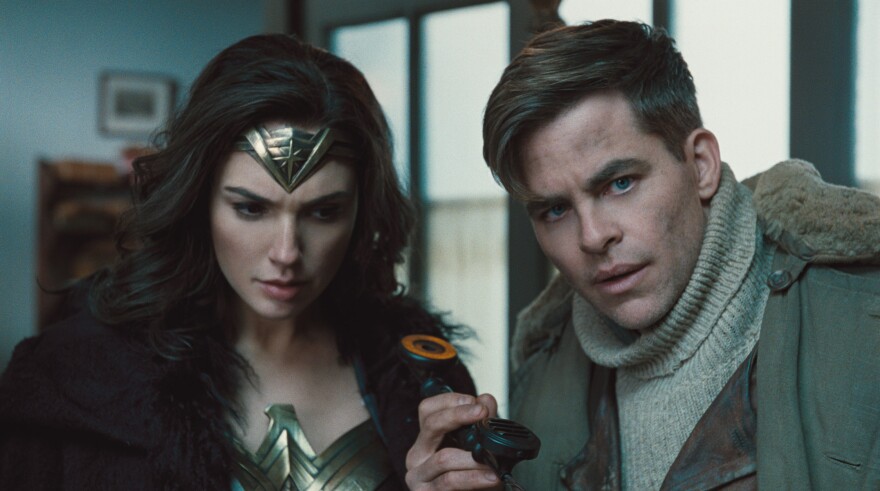For the most part, American mass-market movies have been so repetitive and listless in recent years that any picture offering something just slightly new or lively is a relief. Such movies also get overpraised. Wonder Woman is now being hailed as the savior of human culture. It’s not that, but at least it gives the girls – and the boys – in the audience a chance to see a woman character who’s active and alive, who – mostly – is not dominated by a stronger male character, and who doesn’t stand around posing for the ogling men in the theater. There’s a long tradition of women being filmed, or painted, as if they were under the control or ownership of the male audience. This Wonder Woman, named Diana and played by Gal Godot is – again mostly – her own person. And that’s a step in a good direction.
The first 20 minutes or so of the film have spunk. It’s all women; they’re Amazons, with a deep mythological heritage – they descend from the Greek gods on Mount Olympus, and they’re fun to watch. They ride horses at breakneck speed, leap high in the air, do elaborate swordplay and shoot even three arrows all at once. There’s but one child among them, created by Zeus and given a special status. Only this girl, Diana, has the magical power to defeat Ares, the god of war. That’s her great task, to end war.
Good for her. I wish her well, and the world needs her help. And if Diana, the comic book figure Wonder Woman, in her dramatic breastplates and short skirts, embarks on a fantasy quest to end war, hooray. But for reasons that make little sense, Diana gets involved in World War I, which was an actual event, and while at the time it was hailed rather optimistically as “the war to end all wars,” it was not and did not, so Wonder Woman traps itself, in real history, where Diana can’t have real power.
And no fantasy about killing Ares and ending war is going to bail this movie out. Diana even takes sides, which also does not help the great cause. In fact, as actual historians know, the unspeakable horror of WWI became a primary cause of WWII. And any human being who’s been awake for 20 minutes since then knows that WWII didn’t end war either. One thought that gives me the heebie jeebies is that neither the makers of Wonder Woman, nor the intended audience know that elementary bit of history.
Comic books and movies are not the same. You can do a lot with still panels that doesn’t fly in live-action motion. Exaggerated comic book close-ups are dynamic in ways that motion pictures are not. And written dialogue with random words in bold face can get away with the preachy clichés that overload this movie with serious tedium.
Along the way, Diana picks up three goofy sidekicks, who make her seem like Dorothy from the Wizard of Oz, and a hunky American intelligence agent (Chris Pine). The gang manage to get into gnarly discussions about the nature of humankind, and who is responsible for war, and ultimately just who is this Greek god Ares in the first place. It’s a drag, and who wants to be in what amounts to a book club with Diana anyway.

By this time, though, Wonder Woman has lost direction completely, and all that’s left is for Diana to do the same old comic book action stuff as her peers in other movies. She runs – she’s a fabulous runner, with a steely, determined scowl on her face. She picks up huge vehicles and heaves them at her enemies.
But it no longer looks like her attempt to end war; it looks cool that she can do this stuff. And the big question pops up – is grotesque killing and mayhem any better if a woman does it. She should return to the island and live in mythology.






